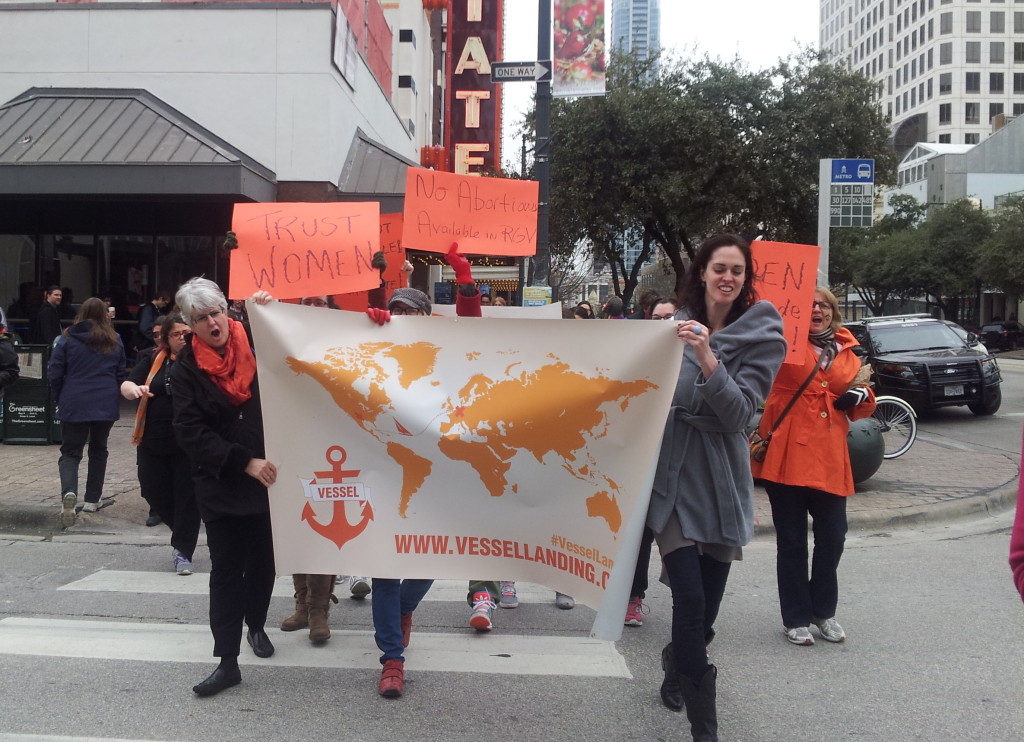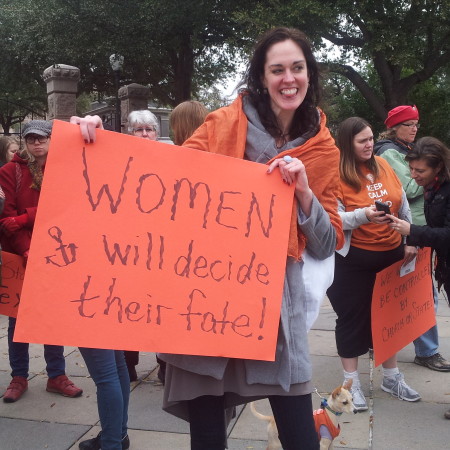Originally published at Firedoglake.
Every 10 minutes, a woman dies from a botched abortion. That’s 47,000 women every year. But what if there were an extremely safe way women could self-administer abortion, without needing the permission of the medical establishment or the state?
Vessel — the first documentary from filmmaker Diana Whitten — studies one woman’s efforts to get the abortion pill and the information needed to use it to women worldwide.
Dr. Rebecca Gomperts worked as a ships doctor aboard Greenpeace vessels but realized she could target a more personal issue — abortion. Because she’s from the Netherlands, where abortion is legal, she realized that if she took a ship into international waters she could help women get abortions even if they were illegal in their home country.

After founding Women On Waves, Vessel follows her first journey to Ireland — which turned out to be largely a publicity stunt. Confusion and red tape around abortion regulations in the Netherlands prevented her from bringing anyone on board for the procedure, though she had built an entire portable medical lab just to administer pills. But her visit was still valuable, revealing how many needed abortion despite intense pressure to remain silent.
The mission continued, with women from many countries brought aboard the ship and given abortion with pills. Each chapter of the film, each visit to a different part of the world, is book-ended with a letter or phone call from a woman in need — women afraid of the consequences of illegal abortion, some who have been raped, or already have children.
Vessel uses simple, evocative animation to explain how women in Brazil discovered they could use the generic drug misoprostil (prescribed for ulcers and post-partum bleeding) to self-induce abortions via miscarriage, a method that later became approved by the World Health Organization. It even animates the process of using misoprostil to induce abortion, meaning every viewer of the movie is empowered to pass on the basic knowledge.
Eventually, Women On Waves and its sister organization Women On Web expanded their work — in addition to just visiting other countries to perform abortions, the team began teaching women in other countries how to safely use misoprostil. By spreading the knowledge, women can continue to empower each other, like those first Brazilian — as women have done throughout history.
With local assistance, they take direct action — in Ecuador, activists perform a banner drop from the Virgin Mary statue that towers over Quito offering abortion information. In Nigeria, their teaching goes undercover as a seminar on health for mothers, with lessons on how to procure quantities of the drug from pharmacists. Even some in the “liberal” Netherlands oppose her work — during a Q&A session, Gomperts revealed that a gynecologist the organization works with will soon go on trial there, accused of offering illegal abortions in Spain.
Viewing Vessel in Texas was a powerful experience. It premiered at a movie theater in downtown Austin just blocks from the Texas Capitol where this summer legislators voted to create devastating new restrictions on abortion access, despite the vocal protests of thousands of women and men who essentially occupied the building for days.
After giving the screening a standing ovation, viewers — along with Dr. Gomperts and director Diana Whitten — joined local activists in a small march to the Capitol. Though numbers were small, we revived some of our favorite chants of the summer’s action (“WHOSE Choice?” “Our Choice!”) and felt a little hope that through direct action and political lobbying (and for those daring and desperate enough, illegal use of misoprostil) abortion access would return despite closing clinics.
Talking with Dr. Rebecca Gomperts and Vessel Director Diana Whitten
Before the march, I got a few minutes to talk about Vessel with its director and subject about the film and the war on women’s access to healthcare.

Kit O’Connell, Firedoglake: Spain looks like it’s about to make abortion illegal again. There’s been a rollback in Texas. What’s happening? Why has this happened? We fought so hard for for this, why are we going backwards?
Dr. Rebecca Gomperts: I can’t answer that question, because I don’t know. I don’t understand this. It’s against every common sense. It’s against scientific research. It’s against public health interest.
FDL: What can people in Texas do? You’re not able to distribute the pills here is that correct?
RG: We’re not providing to the United States. Or, at least, not yet.
FDL: Do you have plans to support Texas?
RG: There’s so much work to be done everywhere. I think there are things you could do in Texas, but we have to make the time and effort to do it. As anywhere else, it will depend on the local movements. Whenever we go somewhere, it’s the local groups that are doing the work — with knowledge, with media attention. The people locally have to do it. I would be very interested in thinking through what the possibilities would be here, in order to get women back the right to access to safe abortion and what kind of projects you could possibly start here. But we cannot do it.
FDL: There’s nowhere to park a boat here.
RG: The rivers are a good option.
FDL: Have you considered that?
RG: Well, I am not going to come here with the boat in the rivers, but one of the things that should be looked at is whether rivers are covered by federal law and whether it’d be a possibility for doing something here.
FDL: Were there favorite moments in the film or moments you wish you could have caught that you missed?
Diana Whitten: There was a lot of footage to work with. There were a lot of things we had to pull from the story because it was over ten years of footage of what happened. So there were things that hurt to take out, but there were also some of my favorites that were left in. The arrival in Spain scene was probably most of the exhilarating days I’ve ever had shooting.
FDL: How long have you been working on this project?
DW: Seven years.
FDL: Seven years! How did you get involved? You were picking up some footage that had already been shot, I guess?
DW: Rebecca was a great collaborator with that. She knew how to find how to find the previous filmmakers that had shot earlier campaigns and they were kind enough to donate footage to the film.
RG: I have one more thing I’d like to say.
FDL: Please, go ahead.
RG: Medical abortion gives the opportunity to go under the radar. There’s really access to the pills, for example from Mexico, from India. There’s places where people can get them. If people would set up an underground network to provide medical abortions through the mail — it would be possible to do it and it would be really hard to track it down. Of course, people run a legal risk when they’re doing that but I think that if you have 1,000 people involved in doing that it will be really difficult to prosecute 1,000 people for participating. So it’s about mobilizing around this and making sure women get access to the medicine.